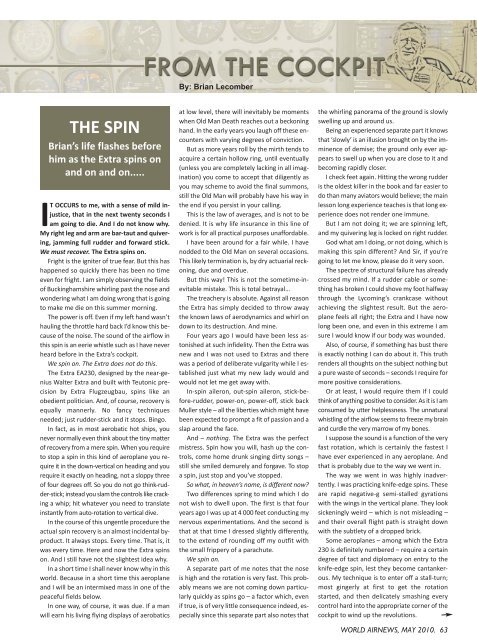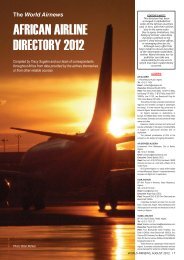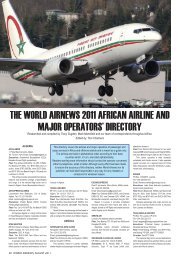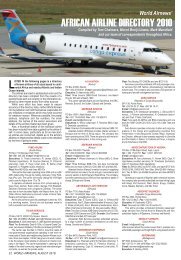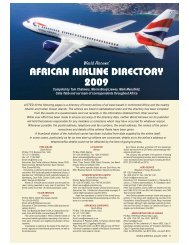May 2010 covers_Covers.qxd - World Airnews
May 2010 covers_Covers.qxd - World Airnews
May 2010 covers_Covers.qxd - World Airnews
You also want an ePaper? Increase the reach of your titles
YUMPU automatically turns print PDFs into web optimized ePapers that Google loves.
THE SPIN<br />
Brian’s life flashes before<br />
him as the Extra spins on<br />
and on and on.....<br />
IT OCCURS to me, with a sense of mild injustice,<br />
that in the next twenty seconds I<br />
am going to die. And I do not know why.<br />
My right leg and arm are bar-taut and quivering,<br />
jamming full rudder and forward stick.<br />
We must recover. The Extra spins on.<br />
Fright is the igniter of true fear. But this has<br />
happened so quickly there has been no time<br />
even for fright. I am simply observing the fields<br />
of Buckinghamshire whirling past the nose and<br />
wondering what I am doing wrong that is going<br />
to make me die on this summer morning.<br />
The power is off. Even if my left hand wasn’t<br />
hauling the throttle hard back I’d know this because<br />
of the noise. The sound of the airflow in<br />
this spin is an eerie whistle such as I have never<br />
heard before in the Extra’s cockpit.<br />
We spin on. The Extra does not do this.<br />
The Extra EA230, designed by the near-genius<br />
Walter Extra and built with Teutonic precision<br />
by Extra Flugzeugbau, spins like an<br />
obedient politician. And, of course, recovery is<br />
equally mannerly. No fancy techniques<br />
needed; just rudder-stick and it stops. Bingo.<br />
In fact, as in most aerobatic hot ships, you<br />
never normally even think about the tiny matter<br />
of recovery from a mere spin. When you require<br />
to stop a spin in this kind of aeroplane you require<br />
it in the down-vertical on heading and you<br />
require it exactly on heading, not a sloppy three<br />
of four degrees off. So you do not go think-rudder-stick;<br />
instead you slam the controls like cracking<br />
a whip; hit whatever you need to translate<br />
instantly from auto-rotation to vertical dive.<br />
In the course of this ungentle procedure the<br />
actual spin recovery is an almost incidental byproduct.<br />
It always stops. Every time. That is, it<br />
was every time. Here and now the Extra spins<br />
on. And I still have not the slightest idea why.<br />
In a short time I shall never know why in this<br />
world. Because in a short time this aeroplane<br />
and I will be an intermixed mass in one of the<br />
peaceful fields below.<br />
In one way, of course, it was due. If a man<br />
will earn his living flying displays of aerobatics<br />
By: Brian Lecomber<br />
at low level, there will inevitably be moments<br />
when Old Man Death reaches out a beckoning<br />
hand. In the early years you laugh off these encounters<br />
with varying degrees of conviction.<br />
But as more years roll by the mirth tends to<br />
acquire a certain hollow ring, until eventually<br />
(unless you are completely lacking in all imagination)<br />
you come to accept that diligently as<br />
you may scheme to avoid the final summons,<br />
still the Old Man will probably have his way in<br />
the end if you persist in your calling.<br />
This is the law of averages, and is not to be<br />
denied. It is why life insurance in this line of<br />
work is for all practical purposes unaffordable.<br />
I have been around for a fair while. I have<br />
nodded to the Old Man on several occasions.<br />
This likely termination is, by dry actuarial reckoning,<br />
due and overdue.<br />
But this way! This is not the sometime-inevitable<br />
mistake. This is total betrayal…<br />
The treachery is absolute. Against all reason<br />
the Extra has simply decided to throw away<br />
the known laws of aerodynamics and whirl on<br />
down to its destruction. And mine.<br />
Four years ago I would have been less astonished<br />
at such infidelity. Then the Extra was<br />
new and I was not used to Extras and there<br />
was a period of deliberate vulgarity while I established<br />
just what my new lady would and<br />
would not let me get away with.<br />
In-spin aileron, out-spin aileron, stick-before-rudder,<br />
power-on, power-off, stick back<br />
Muller style – all the liberties which might have<br />
been expected to prompt a fit of passion and a<br />
slap around the face.<br />
And – nothing. The Extra was the perfect<br />
mistress. Spin how you will, hash up the controls,<br />
come home drunk singing dirty songs –<br />
still she smiled demurely and forgave. To stop<br />
a spin, just stop and you’ve stopped.<br />
So what, in heaven’s name, is different now?<br />
Two differences spring to mind which I do<br />
not wish to dwell upon. The first is that four<br />
years ago I was up at 4 000 feet conducting my<br />
nervous experimentations. And the second is<br />
that at that time I dressed slightly differently,<br />
to the extend of rounding off my outfit with<br />
the small frippery of a parachute.<br />
We spin on.<br />
A separate part of me notes that the nose<br />
is high and the rotation is very fast. This probably<br />
means we are not coming down particularly<br />
quickly as spins go – a factor which, even<br />
if true, is of very little consequence indeed, especially<br />
since this separate part also notes that<br />
the whirling panorama of the ground is slowly<br />
swelling up and around us.<br />
Being an experienced separate part it knows<br />
that ‘slowly’ is an illusion brought on by the imminence<br />
of demise; the ground only ever appears<br />
to swell up when you are close to it and<br />
becoming rapidly closer.<br />
I check feet again. Hitting the wrong rudder<br />
is the oldest killer in the book and far easier to<br />
do than many aviators would believe; the main<br />
lesson long experience teaches is that long experience<br />
does not render one immune.<br />
But I am not doing it; we are spinning left,<br />
and my quivering leg is locked on right rudder.<br />
God what am I doing, or not doing, which is<br />
making this spin different? And Sir, if you’re<br />
going to let me know, please do it very soon.<br />
The spectre of structural failure has already<br />
crossed my mind. If a rudder cable or something<br />
has broken I could shove my foot halfway<br />
through the Lycoming’s crankcase without<br />
achieving the slightest result. But the aeroplane<br />
feels all right; the Extra and I have now<br />
long been one, and even in this extreme I am<br />
sure I would know if our body was wounded.<br />
Also, of course, if something has bust there<br />
is exactly nothing I can do about it. This truth<br />
renders all thoughts on the subject nothing but<br />
a pure waste of seconds – seconds I require for<br />
more positive considerations.<br />
Or at least, I would require them if I could<br />
think of anything positive to consider. As it is I am<br />
consumed by utter helplessness. The unnatural<br />
whistling of the airflow seems to freeze my brain<br />
and curdle the very marrow of my bones.<br />
I suppose the sound is a function of the very<br />
fast rotation, which is certainly the fastest I<br />
have ever experienced in any aeroplane. And<br />
that is probably due to the way we went in.<br />
The way we went in was highly inadvertently.<br />
I was practicing knife-edge spins. These<br />
are rapid negative-g semi-stalled gyrations<br />
with the wings in the vertical plane. They look<br />
sickeningly weird – which is not misleading –<br />
and their overall flight path is straight down<br />
with the subtlety of a dropped brick.<br />
Some aeroplanes – among which the Extra<br />
230 is definitely numbered – require a certain<br />
degree of tact and diplomacy on entry to the<br />
knife-edge spin, lest they become cantankerous.<br />
My technique is to enter off a stall-turn;<br />
most gingerly at first to get the rotation<br />
started, and then delicately smashing every<br />
control hard into the appropriate corner of the<br />
cockpit to wind up the revolutions.<br />
WORLD AIRNEWS, MAY <strong>2010</strong>. 63


